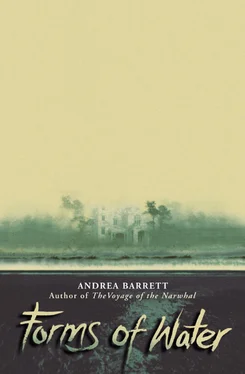But it wasn’t like Henry to brood this way, and when Brendan said, “Let me out. I want to get out,” Henry snapped himself back to the present. He stepped down from the driver’s seat, slid open the side door, and lowered Brendan’s wheelchair to the ground.
Bongo jumped out behind him and then stood sniffing at the mud, and Henry, who felt hungry, reached under the seat and pulled out the paper sack holding the sandwiches he’d bought at the 7-Eleven. Brendan rolled slowly down the smooth black road away from him. Henry had to trot to catch up with his uncle, and when he rested his hand on Brendan’s chair and said, “Wait — where are you going? Why don’t we find a place to sit and have some lunch?” Bongo, leaping and prancing, snatched the sack from Henry’s hand.
“No!” Henry shouted, running after his fleeing dog. “Bongo, goddamnit, Bongo, you come back here!”
But Bongo bolted for the mound of soft dirt surrounding one of the foundations, and while Henry stood gasping, panting for breath, Bongo dug a deep hole and dropped the sack neatly into it. He pushed the dirt over the sack with his nose and then ran back toward Henry, head high, as if he were proud of his foresight.
“YOU TORE DOWN THE HOUSE?” BRENDAN SAID, BUT HENRY was too far away to hear him.
When Brendan had entered the abbey of Our Lady of the Valley, he had made one vow with an easy heart. Poverty, chastity, obedience — those had troubled him, they had broken saints. But stability, the extra vow of his Order, was what had called him in. To stay in one place always, under perpetual enclosure; to call one place home for the rest of his life, the way the Irish monks had adopted their landfalls as they’d climbed stiffly down from their boats — that had appealed to him.
One home, one family in the brothers who had welcomed him. One liturgical year, repeated endlessly; one niche in the wall behind the main altar where, before retiring, he and his brothers had turned toward the Blessed Virgin and sung the Salve Regina. When he’d first come as a postulant, he’d stayed in the guesthouse and been put to work washing dishes and waxing floors. The novice master visited once in a while, but otherwise Brendan had seen the monks only at a distance until the day when he’d finally been received. He’d gone into a room and turned over his clothes and his personal belongings; then he’d donned his new robes and passed through the door that led into the cloister and the novitiate wing. When the monks welcomed him, he’d believed he would never leave.
In his ten years there he had never gone beyond the walls. His family had visited once each year, and between their visits he’d kept silent. He’d spoken only to Father Vincent, his abbot, and to Father Norbert, the novice master; outside of chapter, he and the other brothers never talked, communicating in the archaic sign language peculiar to their Order. Despite that, he’d come to know his fellow monks more intimately than he’d ever known anyone else. Because they didn’t converse, he couldn’t know where they had come from nor why they’d entered the Order; he couldn’t know, directly, what hurt or inspired or disappointed them. But he’d learned to read their faces and eyes and to see their moods in their movements. They’d become familiar to him; they’d become his family. He expected to die among them and rest his bones beyond the orchard.
But then the abbey had been dissolved and his vow had vanished with it. He’d been peregrinating ever since, going forth into strange lands and waiting for another home to reveal itself to him. The abbey in China might have held him if the war hadn’t come, but after the internment camp, after the trial and the march and the massacre, Our Lady of Consolation had been burned to the ground. And then he’d been tainted, a displaced person, a monk without a monastery; he’d lost one abbey to water and another to fire and he’d lost his faith as well. The abbeys that had sheltered him upon his return, in Manitoba and then in Rhode Island, had been guesthouses, rest houses, never more than that. When he’d left the Order and come to stay with his parents in Coreopsis, he’d promised himself that this would be his final home.
He’d forgotten that his parents were old. His mother died, and then his father, when he first became ill, had said, “I’m leaving this place to the children, Brendan — you’ll have the land in Massachusetts, and there’s enough money in the bank to pay the taxes until you decide to sell it. I want the children to have this.”
He’d had to move again. He had tried not to resent the decision — he was so badly crippled by then that he couldn’t take care of himself and couldn’t have stayed in Coreopsis even if the farm had passed to him. He’d moved into the Home and imagined his niece and nephew at peace in the old house. But neither Henry nor Wiloma had ever lived there again. They’d boarded up the place, they told him. Sold all the movable goods. For years he’d dreamed that one of them might move back and raise a family there.
And now Henry, stumbling after his dog, had done this. Brendan rolled himself down the road, heading toward a cluster of half-built houses that stood where his parents’ house might once have been. One shell rose slightly above the others, absorbing the sun and reflecting the breeze in a way that seemed familiar. The land was shattered and scarred, stripped of its trees, built up falsely in some places and falsely hollowed in others, but this place looked as if it might be as hot in the summer as the old house had been.
He wheeled himself up the driveway until he reached the garage, and then he turned and gazed past the ruins at the gentle patchwork below. There were the woods covering the back part of Thompson’s place. There was the pond, there Niedemeyer’s corn, there the silos and pastures of the Cummings’ place, the muddy creek that dried up in the summer, the low hills that rose in the distance — the view, or very near the view, that he’d seen from the parlor where he’d slept. He had first met Henry there, when Henry was fifteen. Henry had walked into the room where Brendan lay, and Brendan’s mother had said, “Henry, this is your uncle Brendan.”
She’d looked at Brendan then, clearly uncomfortable with her words. “Brendan?” she’d asked. “You’re sure that’s the name you want to use? Not Ambrose?”
“Brendan,” he’d said, holding a knotted hand out to his nephew. “That’s what people call me.” These people, anyway: this family. Brother Ambrose was the name he’d taken when he’d entered the Order; he’d left it behind with his robes.
Henry had been thin, freckled, stringy from farm work. His hair had been cut too short around his ears, exposing a pale line where his tan broke off. The skin around his nails was gnawed and torn, his pants were too small, and his shirt, although clean, was worn. His eyes were guarded, troubled, distant, and he ignored Brendan’s outstretched hand.
“You knew my father?” he said — the first words Brendan ever heard him speak.
“I’m his brother,” Brendan replied, startled and hurt. He frowned at his mother and she twisted her hands.
“I told them,” she said. “I told them all about you.”
Henry had ignored her. “You’re too old,” he said. After a minute, Brendan had figured out what Henry meant. Frank junior had been thirty-four when he’d died five years earlier; Brendan, at forty-five, had known he looked sixty. “Brendan’s the oldest,” his mother said, as if that explained everything.
Henry looked at her with a weary disappointment that told Brendan more than he wanted to know about how the children had fared since their parents’ deaths. Then Henry turned his gaze on him. “If you’re my father’s brother,” he said, “how come I never saw you before? How come you didn’t help him? How come you didn’t help us?”
Читать дальше












